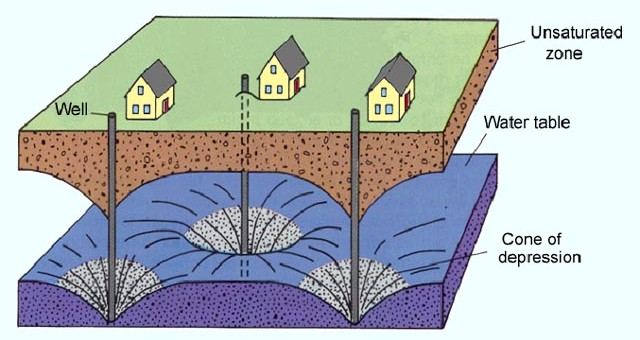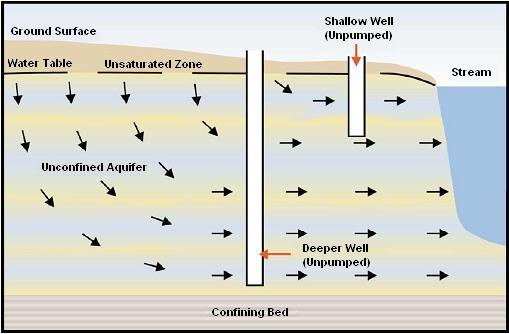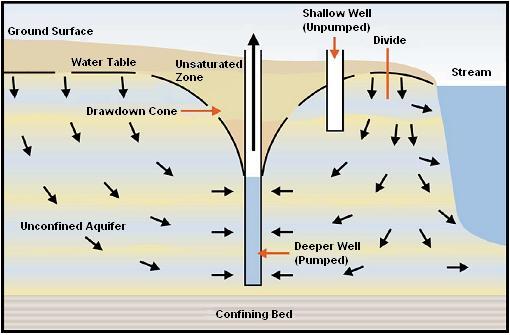Your well and pump were performing fine, so let's assume that remains the case (and that your pump is still primed). Then there are two possible contributing causes of your well running dry,
A: there is not enough volume of water currently stored in the aquifer (in the zone being pumped) to supply the needs of both you and your neighbors, or
B:water is being pumped out at a rate faster than the water can move through the aquifer to get to your well.
The volume of water depends on your soil porosity (think of how much water can be poured into a sandbox full of sand). The soil permeability controls how fast water is able to flow through your soil to your well (sand allows a lot of flow, silty sand less).
Pumping at your well immediately drops the water level within your well borehole. This diverts the local groundwater towards your well, dropping the local water table in a 3D "cone of depression" shape. Each pumping well has its own cone of depression (forcing water around the well to flow towards each well). Increased pumping results in an even wider and steeper-sloped cone of depression. Here is a normal sustainable situation for three houses.

Now your "spring-fed" pond water surface indicates the water table level over at the pond. The local groundwater table will be higher towards the spring source (usually towards higher terrain).
I'm not sure where your house is located relative to the lake and other two houses (actually their wells), or the direction of natural groundwater flow, but here is an example of a typical groundwater situation with NO pumping of the wells shown (think lake instead of stream in your case):

Pumping your shallow well conservatively may cause only a small cone of depression and so the figure above could have been close to your situation for years. A drought would have reduced spring flow, dropped the local water table (slightly or severely), and would have dropped the level of the lake some also, but as long as your well could still pull in sufficient water, you would be OK.
Or not. I was in a drought in Indonesia that dropped the water table below the bottom of my well. I had to climb down, dig my well deeper, extend the well intake pipe, and then it was good to go after repriming the pump. We hand pumped.
Let's get back to your situation and consider what happens when your first neighbor moves in, constructs a deeper well than yours, and pumps out more water than you – it will create a bigger and deeper cone of depression than for your well. The smaller the soil porosity and permeability values, the larger the resulting cone of depression. The new well could actually reverse the water flow direction at your well (see figure).

To the degree the new well's cone of depression interacts with yours (they can overlap), you lose groundwater feeding your well (he is stealing what was formerly your flow of groundwater). Now when your second neighbor moved in -- repeat all of the above.
In some U.S. states or countries this is all tough luck, the law ignores what it can't see. In other states or countries, you may have a grandfathered right to the water and you can ask/sue your neighbor(s) for damages to help pay for what they have done (assuming you can assign blame).
Please note there is a time delay as groundwater moves through tortuous paths of porous soil. If a neighbor starts pumping more water (on average), his cone of depression expands wider and deeper (slowly) until the total water flowing into the well equals the total water pumped out. A larger cone of depression captures a larger volume of flowing groundwater to send to the well.
On the other hand, if your neighbor would suddenly stop pumping altogether, it would take time for his cone of depression to reduce in size and finally disappear – going back to the original groundwater table levels before he started pumping his well. If this guy's pumping had caused your well failure, depending on the soil properties, you would see your well producing again in days, weeks or months.
Now the drought is also "stealing" your groundwater by dropping the overall natural water table, but this is caused by mother nature, so placing legal blame gets more complicated in your current situation. Again, there would be a time delay effect after the drought ends. Apparently, the last 3 months of rain that soaked into the soil on higher terrain haven't had time yet to flow down and restore your local groundwater table (unless the drought effect was actually small).
In any event, it appears that the collective cone of depression created by you and your neighbor's pumping (under drought conditions) dropped the local water table below the bottom of your well. Perhaps the drought is the primary culprit (time delay) or your neighbors' pumping could be the main cause of you losing your well water (due to their increased pumping demand during the drought). Or maybe both conditions were needed to cause your present grief.
If you carefully measured the lake level, you would find that its level has dropped due to the drought. Your neighbors' pumping could have also dropped the lake level AND/OR your local water table (affecting your cone of depression also – see second figure below). If you guys pump enough, the entire lake could go dry (third figure below).

So even if you shell out big money and drill a new deeper well, if the 3rd figure is the resulting situation, you could suffer other unexpected consequences. Besides the lake level dropping, if the area water table drops below the root zone of your trees (compare the 2nd to 3rd figure), then you guys will see your trees start to die. The new larger cone of depression could also intersect contaminated water and send it to your well (from an outhouse, dump area, crop fertilizer, or other contaminated soil).
Note that the lake (or a stream for other people) is NOT the source of your water, it just indicates where the current water table is; the true source of your water is the regional groundwater flow coming down from higher ground.
Now, about the third neighbor that you say is coming. A new well equals more pumping and more demand on your aquifer – and so you might have ended up with the same well problem even without the drought. Be aware this new neighbor's well could make your problem worse.
And don't forget the time delay… the new 3rd neighbor could start pumping, but it takes time for his growing cone of depression to empty the surrounding soil of water, and then grow to a stable size. You may not "feel" the full effect of his well pumping for days or weeks or months later.
It appears that you, your existing neighbors, and the new guy coming in need to hire professional help to sort things out, predict what can happen, and figure what needs to be done. What is happening to you could happen to your neighbors once the new guy gets pumping, or if the drought were to return and get worse.
First, you and your neighbors need to measure your current water usage and then estimate your projected total water needs (house and farming/garden/animal use). Next, contact a licensed well professional or better, a groundwater hydrologist directly, to determine what's going on, or if the new house well and aquifer can meet the increased demand (the hydrologist will likely need to do pumping tests). Professionals can also help determine the well yield, which is the maximum rate that you can pump a well and still have the water level in the well remain above the pump intake.
Legal assistance may be an additional road to go down (these guys may need to pay for your new well capacity, or limit their pumping so it does not adversely affect you. But only a groundwater hydrologist (hydrogeologist/geohydrologist) can unravel these mysteries so that reasonable people can take action.
A new deeper well for you could be advantageous depending on your local geology. Your shallow well is susceptible to contamination (more people in the area = more chance of this). A deeper well could tap a different soil or rock unit with a different supply of water, giving you not only a more dependable supply, but a safer water supply. Good luck.